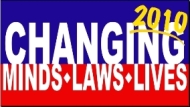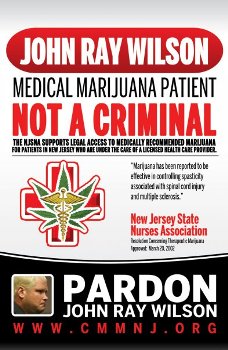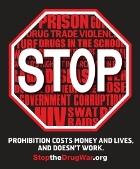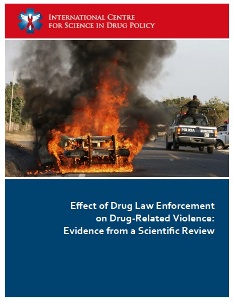Reed College in Portland, Oregon, has a decades-old reputation for rigorous academics and counterculture values. Now, after two Reed students died of heroin overdoses in two years, state and federal prosecutors are lowering the boom, starting with this weekends' annual end of school-year party.
San Francisco has become only the second city in America to host a drug user union, after New York City. But the movement is spreading internationally.
2010 is a critical year in the effort to end prohibition and the war on drugs. The StoptheDrugWar.org (DRCNet) "Changing Minds, Changing Laws, Changing Lives" campaign is asking for you to pitch in -- your support is more important now than it has ever been before!
MS sufferer John Wilson walked out of a New Jersey prison Thursday, free on appeal for growing 17 plants last summer. A month after he was sentenced in December, New Jersey became the 14th medical marijuana state. Now, there is a renewed effort to win a pardon for him.
No letup in Mexico's prohibition-related violence this week, with another 208 killings to add to the toll.
If you want to reduce "drug-related" violence, sending in more cops and cracking down harder is exactly the wrong thing to do, a review of 20 years worth of studies has concluded.
For five years, Dr. Stephen Schneider and his wife, Linda, operated a pain management clinic in Haysville, Kansas. Now, they are on trial as drug dealers in a federal prosecution that revisits the ongoing conflict between the imperatives of pain treatment and those of drug law enforcement.
A New York cop heads to prison for dealing dope and groping women, a pair of Texas cops land in hot water, and California seems to have something of a problem with its drug lab techs.
Medical marijuana in Tennessee?!?! Well, not this year, but a plan to form a study group for next year is gaining ground.
If you're in Florida and you're a fan of pipes or bongs, it's time to stock up. They're going to be hard to find for sale in the Sunshine State in the near future. Marijuana use is expected to decrease as a result (just kidding).
The leader of Britain's largest nurses' union has called for prescribing heroin to addicts through the National Health Service. His union debated the issue this week, but made no decision.
Events and quotes of note from this week's drug policy events of years past.
"A New Marijuana Legalization Campaign," "Florida Cops Repeatedly Arrest Quadriplegic for Medical Marijuana," "If You Kids Don't Quit Partying, We'll Prosecute Your College," "Banning Pot Didn't Work, So Let's Try Banning Bongs," "DC's Medical Marijuana Law Needs Your Support Now," "Will Medical Marijuana Lead to Full Legalization?," "How to Build a Movement," "Will DEA Help States Implement Medical Marijuana Laws?"
Do you read Drug War Chronicle? If so, we need your feedback to evaluate our work and make the case for Drug War Chronicle to funders. We need donations too.
Apply for an internship at DRCNet and you could spend a semester fighting the good fight!
While Oregon sees hundreds of drug overdose deaths a year -- from both illegal and prescription drugs -- a pair of publicity-seeking state and federal prosecutors have made a small Portland liberal arts college where two students have died of heroin overdoses in the past two years the public focus of their attack on the drug trade. Last week, Reed College President Colin Diver was summoned to the federal courthouse in downtown Portland, where he was warned that the school could face a cutoff of federal funds, including student loans, if it is not found to be taking "adequate steps to combat illegal drug activity," starting with this weekend's annual school year-end bash, Renn Fayre, which the prosecutors vowed will be filled with undercover police determined to quash drug use and sales.

Renn Fayre (sarako on flickr.com)
According to the
Oregon State Medical Examiner, 119 people died from heroin overdoses in 2008 and 127 in 2009. Including prescription drug overdoses, 492 Oregonians died of ODs in 2008, 270 from prescription opiates. For some reason, the State Medical Examiner did not include prescription drug deaths in the 2009 figures.
In Multnomah County alone, where Reed is located, 63 people died of heroin overdoses in 2008 and 71 in 2009. That's more than one a week for both years. But no other single overdose or pair of overdose deaths has excited the reaction displayed by state and federal prosecutors who went after Reed last week.
Reed makes an excellent target for drug warriors. For decades, the academically rigorous school has had a reputation as a counterculture haven where drug use is accepted. While that reputation is overblown and outdated, students say, it makes the college a handy lightning rod for those engaged in the culture wars.
Enter US Attorney for Oregon Dwight Holton and Multnomah County (Portland) District Attorney Michael Schrunk. In an email to Divers that they asked be forwarded to the Reed community, the prosecutorial pair used the deaths of the two students as a battle cry for a crackdown.
After lamenting the loss of the students, they wrote: "But while now may be a time for reflection and grief, it is also a time for action. It is now time for the Reed community to abandon the myth that drug use is a safe and acceptable form of exploration. It is time for Renn Fayre and Reed to adopt a zero tolerance policy prohibiting illegal drugs flat-out."
It isn't beatnik days anymore, prosecutors wrote, in a bid to appeal to Reed's countercultural heritage: "The illegal drug trade has changed radically since the days when giants like Alan (sic) Ginsberg and Gary Snyder '51 roamed campus here. The fact is that the drug trade is now fueled by one of the most potent forces in the West: greed."
The pair then explained at length how "drug cartels" are "targeting middle class and wealthier kids," then went on to say they made no distinction between non-lethal drug like marijuana and drugs like heroin. "Don't get sucked in by this bogus Siren call. The fact is that if the Reed community insists that this is 'not our problem' and tries to draw distinctions between 'hard' and other drugs, you will send the message that drug use can be safe... It is time for the Reed community to embrace the notion that drug use is not safe and it will not be tolerated -- without fine print, without provisos, and without conditions."
They then issued a blunt warning: "As the top federal prosecutor in Oregon and the Multnomah County District attorney, we have a responsibility to this community -- including you and your families. We cannot, and we will not stand by if drug use is tolerated on your campus. We cannot, and we will not stand by if Renn Fayre is a repeat of years past -- where even in the wake of Alejandro Lluch's death drug use and distribution were allegedly rampant."
Finally, the prosecutorial pair gallantly offered their assistance: "We stand ready to help in any way we can. If need be, we will use all the tools available to us in federal and state law enforcement. We owe that to the people of our community, including you."
A suitably cowed President Diver responded with his own email to the Reed community: "My message regarding drug use at Renn Fayre 2010 is very simple: Do not use illegal drugs. That means no marijuana, hallucinogens, designer drugs, cocaine, amphetamines, opiates, or other illegal substances."
Diver said he got a forceful and direct message from the prosecutors: "Shut down illegal drug use and distribution at Reed College, starting with Renn Fayre. Based on ongoing criminal investigations, including conversations with current and former students and other sources, these officials have heard numerous allegations about drug use at Reed, and particularly at Renn Fayre."
Diver also mentioned the threats he received: "In the course of the conversation, the US Attorney pointedly referred to a federal statute that makes it a criminal and civil offense for anyone knowingly to operate any facility for the purpose of using illegal drugs. We were also reminded of federal legislation that allows all federal funding -- including student loans -- to be withdrawn from any college or university that fails to take adequate steps to combat illegal drug activity."
On Wednesday, Diver was forced to clarify. According to Inside Higher Education News, the US Attorney only cited the federal crack house statute, under which Reed could face large fines, not the Drug-Free Schools Act, which is the statute that could impact student loans, Diver said. While the US Attorney "referred to federal legislation that could be applied to the college if it failed to crack down more forcefully," he never cited the Drug-Free Schools Act, Diver conceded.
In his email to the Reed community, Diver also delivered a more immediate warning: "We have been told that, during next weekend's Renn Fayre celebration, undercover Portland police officers will be circulating on campus, uniformed Portland police officers will be on alert to respond immediately to calls, and prosecutors stand ready to process criminal charges."
The prosecutorial shakedown has stirred controversy both on campus and in the broader Portland community, with many defending Reed's students, while others say the "druggies" need to be brought under control. In any case, Reed's reputation has complicated its relations with law enforcement.
"There's always a market here for a 'Reed is strange and weird' story," Bear Wilner-Nugent, a Reed alumnus, one-time director of Renn Fayre, and Portland criminal lawyer told USA Today this week. "I think it's going to scare students using drugs to be more underground. I think it's going to discourage students from seeking help for drug problems. It's a waste of resources on what is a tiny fingernail clipping in the drug problem," he said. "It's showboating."
Wilner-Nugent will be attending Renn Fayre again this year, and he said it compares favorably with end-of-semester parties at other schools. "There's a less macho attitude to it, there is less drinking and so you don't see the sexual harassment compared to other institutions," he said. "They are busting one of the saner and healthier college parties in the nation."
"This is the first time any college president has been threatened with the loss of federal funding because of campus drug use, so that's pretty interesting," said Jon Perri, West Coast coordinator for Students for Sensible Drug Policy (SSDP). "We need to be criticizing those prosecutors, as well as law enforcement, for sending in undercover agents and spreading misinformation about drug dealers coming in to target rich white kids. And we need to keep after Reed President Divers, who after his sit-down with prosecutors, basically said don't do illegal drugs, then mentioned a long list of drugs that doesn't include alcohol, which does more harm," Perri pointed out.
"Our chapter there is actively participating in the planning for Renn Fayre, and they will be waging a Good Samaritan policy campaign, while the feds are coming in and trying to do the same old stuff," Perri. "Reed SSDP is trying to pitch it as instead of trying to increase penalties, try something that will save lives."
Perri said he worked with students at Reed to reactivate the Good Samaritan campaign after the second student death. Good Samaritan policies allow drug overdose victims or their friends to seek help without fear of arrest, or, in the case of colleges, academic discipline. "I encouraged them to get it back up and running," he said. "They were wary of starting a campaign because they didn't want to be seen as politicizing those kids' deaths, but that's what the prosecutors have now done."
While by all accounts there has been drug use at Renn Fayre in past years, it is a much milder, less raucous event than many end-of-year campus parties, with a penchant for hallucinogens -- not heroin -- and an abundance of weed. Renn Fayre also features full-body human chess, softball tournaments, a great feast, and lots of music. And alcohol for those over 21.
"Everyone here fears that come Saturday there could be mass arrests for marijuana possession and underage drinking," said Reed SSDP chapter head McKenzie Warren. "It some senses, it's not totally surprising because there has been a lot of local press aimed at Reed, but there is a lot of worry," she reported. "ODs happen all the time, but the homeless population isn't going to get the same focus as a well-known private liberal arts college," said Warren. "Over the years, Reed earned a reputation as a crazy drug-taking school. Maybe it once was, way back in the 1970s, but these days the reputation outstrips the reality."
Reed SSDP is working with other campus groups to protect students from the tender ministrations of law enforcement, Warren said. "We have a number of groups working on harm reduction this weekend, we've had a Reed alumni who is a lawyer come and give talks on how to deal with the police, especially with respect to dorm rooms, and we printed up 1,500 ACLU know your rights cards. We've also been putting up flyers and posters."
And it will push for a full-fledged Good Samaritan policy. "We have only half a Good Samaritan policy," said Warren. "The school just adopted a new implementation plan for our drug policy, and it differentiates pot and alcohol from harder drugs. There is a Good Samaritan policy for alcohol and marijuana, but not for harder drugs. The administration is trying to crack down."
A Good Samaritan policy for alcohol makes sense; for marijuana, the need for it is much less. But a Good Samaritan policy that excludes the drugs that are most likely to kill people doesn't make much sense. There is work to be done at Reed, and the Good Samaritan battle looks like a good way to counter the weight of the prosecutorial offensive.
back to top
Thanks to the on-the-ground efforts of local harm reductionists and the funding largesse of the Drug Policy Alliance, San Francisco is now the home of only the second drug user union in the United States. The nascent effort is just getting off the ground, but plans to follow in the footsteps of Canada's Vancouver Area Network of Drug Users (VANDU) and the New York City VOCAL drug user union affiliated with the NYC Aids Housing Network.
While self-identified drug user unions are rare in the US, they have a history dating back to the Dutch "junkiebund" of the 1970s. The movement is currently spreading internationally, with affiliates of the
International Network of People Who Use Drugs (INPUD) operating in Europe, North America, South America, and Asia. And while medical marijuana patients did not refer to themselves as drug users, they have done similar organizing based on their use of the weed.
"We gave a $35,000 grant to the Harm Reduction Therapy Center to organize drug users in San Francisco, said Laura Thomas, DPA California state deputy director. "It is an annual grant, and future funding depends on HRTC re-applying for the funds. We have funded VOCAL in New York for several years."
DPA sees drug user groups as a key component in efforts to reduce the harms of both drug use and prohibitionist drug policies, said Thomas. "We hope that drug users in San Francisco will have a voice in policy decisions that affect them," she said. "We hope that they will become an active and organized part of efforts to reduce the harm related to both drugs and the war on drugs in San Francisco. The group is still in the process of forming and determining what their priority issues are, so I can't speak for what they are going to be working on."
"While we haven't quite chosen our main campaign, we've been talking about what we would ideally like San Francisco to look like, about having a safe place to inject, and about having a safe place to consume other drugs, too," said Alexandra Goldman, the organizer for the group. "Within a couple of months, we will choose our first official campaign," she vowed.
"We are also interested in working to decrease the stigma, both within and outside the drug using community," Goldman added. "We're trying to work with health care providers to make it a more positive experience. Our people tend to wait until they are very seriously ill because they are not treated very well. In our meetings, I'm hearing about how people don't get the prescribed pain medications they need because the doctors don't like them."
The group has already been active, joining in protests against the city's proposed ordinance barring people from sitting or lying on public sidewalks. Homeless people in neighborhoods like Haight-Asbury have roused the ire of business owners with their presence, but activists say they have no place to go and should not be criminalized.
The SF Drug User Union participation in the sit/lie protests makes sense given that many of its members are homeless and that its meetings are generally being held in homeless drop-in centers in the Tenderloin and the Mission. The group boasts about 25 members, with an emerging core group of 10 or 12, but is looking to expand by working with lower income communities and people involved in local harm reduction networks.
"We plan to be active consumers, giving our opinions and our voice on issues and policies that affect us," said Isaac Jackson, the other paid staffer for the union. "People are already asking us for our expertise."
So who can join the union? Anyone who identifies as a drug user, past or present, organizers said. Defining members in that manner allows people to get active without necessarily outing themselves as current users.
"There is no piss test to get into this group," said Jackson. "We have heroin users, speed users, people who drink, pot smokers. Some people think pot's not a big issue, but anyone who wants to work with us, we say 'right on.' We support the legalization campaign and we support medical marijuana. That's a success story, and so is needle exchange, and we'll be trying to learn from those."
The only rule at meetings is no drug dealing, said Jackson. "We don't want people to deal drugs at the meeting or endanger other people in the group by that kind of activity, but if people are carrying, so what? Some people have showed up tweaking. We don't want to say they can't come because they're too high. We want people to feel welcome whatever their level of sobriety."
Forming a drug user union in San Francisco has been an idea that's been batted around for at least a couple of years, but it took some cold, hard cash to make it happen. "There were some attempts to organize drug users in the past, and I was involved in those, but they didn't stick because people had other jobs," said Goldman. "But once that Drug Policy Alliance grant came in, I got hired in November and we had our first meetings in February."
"I worked at a small health agency working with homeless people with substance use here in the Tenderloin, and was also working with some people with the Youth Homeless Alliance in the Haight," said Jackson. "A lot of people said we ought to do something like VANDU. We had a conference here a couple of years ago to try to jump-start a safe injection site, but that was mostly health care providers, not drug users."
San Francisco has one of the highest rates of drug use per capita in the country, Jackson noted. "Since there is so much civil disobedience going on already -- the laws are wrong, when you have thousands of people doing something for a long period of time, it's like passive civil disobedience -- there was an opportunity there to give drug users a voice in a more organized way. We're consumers of all these services -- treatment, law enforcement, the whole drug industrial complex -- we're consumers and have no voice. The time was right for it to start here."
San Francisco organizers took advantage of last fall's DPA conference to learn from existing drug user groups on the continent. "I met with Ann Livingston from VANDU and I got in touch with some of the folks from VOCAL," Goldman said. "They work on stuff around syringe exchange, trying to pass statewide ordinances to keep police from hassling people with needles, things like that. And, of course, they're subject to the same ridiculous drug laws we are."
"Drug user groups such as VOCAL in New York, VANDU in Vancouver, and hopefully this group in San Francisco play an important role in drug policy change and ending the war on drugs," Thomas said. "Drug users are usually the people most directly affected by bad drug policies, and the least likely to have a voice in debates. Drug users as active participants in the political process also helps reduce the stigma that is attached to drug use and makes people reconsider their prejudices about what they think 'drug users' are like. The drug policy reform conversation can only benefit from the active participation of drug user groups."
Separate drug user union meetings are taking place every three weeks in the Tenderloin and Mission districts. For more information about joining the union, send an email to [email protected].
back to top

Dear friend of drug policy reform:
I am writing today to ask you to step up for drug policy reform. 2010 is a critical year in drug policy, with great opportunities for changing minds, laws, and lives:
There is a long, hard road still ahead, but things are definitely moving our way. Like every nonprofit, our funding has been affected by the troubled state of the economy, and we need your help. Can we count on your support in this important year? Please make a generous donation to StoptheDrugWar.org (DRCNet) today!
The support of our generous members has been part of a winning combination that saw us draw nearly two million annual visitors to our web site last year -- the most yet! -- and which saw opinion leaders in the blogosphere using our work on a regular basis. (See links about this below.) StoptheDrugWar.org, thanks to you, is the #1 source for news, information and activism promoting sensible drug law reform and an end to prohibition worldwide. The more we do at StoptheDrugWar.org, the faster the reform movement will grow and the sooner that minds, laws and lives will change.
Your support counts now more than ever -- please join our 2010 "Changing Minds, Changing Laws, Changing Lives" campaign by donating to StoptheDrugWar.org today.
I would like to send you some free gifts to show our appreciation. For a contribution of $30 or more, choose either the important new DVD, 10 Rules for Dealing with Police, or its classic predecessor, Busted: The Citizen's Guide to Surviving Police Encounters -- or choose either of our popular StoptheDrugWar.org t-shirts -- "alcohol prohibition/drug prohibition" or "consequences of prohibition." For a gift of $55 or more, you get to pick any two... for a gift of $80 or more, pick any three... for a gift of $100 or more you can get all four! (Want to substitute? No problem. Choose any item from our inventory of books, videos and StoptheDrugWar.org items.)
By joining today, you will make an immediate impact by helping StoptheDrugWar.org:
We are truly seeing more good things happen than ever before -- and the road ahead while challenging is also promising. Please donate to StoptheDrugWar.org today - with your help, we can win this.
Sincerely,

David Borden
Executive Director, StoptheDrugWar.org (DRCNet)
P.S. Prohibition does not work -- and more and more people know it. Now is the perfect time to galvanize support for the cause. Please send in your donation and get your thank-you gifts today! Thank you for your support.
back to top
New Jersey medical marijuana patient John Wilson walked out of Southern State Prison Thursday, freed on bond while he appeals his five-year prison sentence for growing his own medicine. Wilson was convicted in December of manufacturing marijuana for growing 17 plants and possession of hallucinogenic mushrooms. The following month, New Jersey became the 14th state to approve medical marijuana. That law will go into effect August 1.

CMMNJ Wilson pardon campaign poster
Wilson, a 37-year-old with multiple sclerosis, had served five weeks of his prison sentence in a succession of local and state jails and prison when a court ruled Monday he could be freed on bond pending appeal. It took until Thursday for his family to come up with the $15,000 cash bail.
During his trial, Wilson was blocked from entering evidence about his medical condition or telling jurors he was growing marijuana to treat it. That is the issue that will be heard on appeal.
Wilson's case garnered media attention, thanks in part to its curious juxtaposition with the Garden State's move toward medical marijuana and thanks in part to supporters organized by the Coalition for Medical Marijuana-New Jersey, which organized demonstrations at the Somerset County Courthouse. "People with MS who seek cannabis therapy should not be in prison," said the group's Chris Goldstein.
Medical marijuana supporters Sens. Raymond Lesniak and Nicholas Scutaria have called for Gov. Chris Christie to pardon Wilson.
Until then, Wilson finds himself in something of a medical predicament. He told the Associated Press upon his release that he was not going to use medical marijuana until it becomes legal this summer. "Whenever they open the program, I would register and abide by the law," Wilson said. "You know what I mean." But in the meantime, he can't afford his $3,000 a month MS medicine.
back to top
by Bernd Debusmann, Jr.
Mexican drug trafficking organizations make billions each year smuggling drugs into the United States, profiting enormously from the prohibitionist drug policies of the US government. Since Mexican president Felipe Calderon took office in December 2006 and called the armed forces into the fight against the so-called cartels, prohibition-related violence has killed over 19,000 people, with a death toll of nearly 8,000 in 2009 and over 3,000 so far in 2010. The increasing militarization of the drug war and the arrest of several high-profile drug traffickers have failed to stem the flow of drugs -- or the violence -- whatsoever. The Merida initiative, which provides $1.4 billion over three years for the US to assist the Mexican government with training, equipment and intelligence, has so far failed to make a difference. Here are a few of the latest developments in Mexico's drug war:

Minerva Bautista, wounded in recent Michoacan attack
In Monterrey, gunmen raided two hotels and kidnapped at least six people. The incident began when dozens of gunmen stormed the Holiday Inn at around 3:00am and went room to room looking for specific individuals -- taking at least four guests while allowing others to leave. The hotel receptionist and possibly a security guard were also abducted. Another receptionist was abducted from a hotel across the street. The gunmen were apparently being led to the fifth floor by a handcuffed man with whom they arrived. Before the attack, the gunmen blocked off access to and from the hotels by parking stolen trucks in the road.
Friday , April 23
In Ciudad Juarez, six federal police officers and a local policewoman were killed in an ambush. The incident took place after two patrol cars were flagged down for assistance by an unidentified man, only to be ambushed by several gunmen. On Monday (April 26), Mexican police arrested five suspects in the incident, all thought to be members of La Linea, the enforcement arm of the Juarez Cartel. In addition to the killing of the police officers, the gunmen confessed to 39 other homicides since 2009, and at least 21 extortions.
Saturday , April 24
In Michoacan, gunmen attacked the motorcade of a high-ranking public security official. Four people were killed and eleven were wounded, including the Michoacan State Security Secretary, Minerva Bautista. Gunmen wielding AK-47's and using fragmentation grenades attacked the convoy, sparking a firefight in which two bodyguards were killed, as well as two civilians who were caught in the crossfire.
Meanwhile, in Monterrey, a soldier was wounded and six gunmen were killed in a clash between the army and suspected drug traffickers.
Sunday , April 25
In Sinaloa, hooded prisoners killed four men inside a prison. The four men had been at the prison for 15 minutes and were on their way to a medical checkup when they were attacked and stabbed by the assailants. It was later reported the four men who were killed had been under investigation in the murder of several police officials, including two police chiefs. Violence is common in Mexican prisons, and many local jurisdictions have complained of having to house violent federal inmates with ties to drug cartels alongside common delinquents.
Wednesday , April 28
In Ciudad Juarez, gunmen shot dead eight individuals inside a bar in the center of the city. At approximately 4:00am a group of 20 gunmen entered the bar and ordered most clients and staff to leave, before leading the eight victims to a parking lot where they were shot. At least two of the dead were adolescents. The bar where the incident took place is just two blocks from a hotel where a large contingent of federal police officers is housed.
In another part of Ciudad Juarez, three men were shot dead and another left seriously wounded after being attacked in a shopping center parking lot.
In Nuevo Leon, soldiers raided a ranch in Sabinas Hidalgo and found 16 hostages. After a brief firefight with approximately 10 gunmen, two of whom were killed, soldiers stormed the compound and discovered the 16 hostages, which included a mother and child. The other eight gunmen managed to escape into the nearby mountains. It appears that the ranch and the gunmen belonged to the Zetas Organization. At least three of the hostages had been taken at gunpoint from an improvised checkpoint on the Monterrey-Reynosa highway.
The incident was the second hostage rescue in 24 hours in Nuevo Leon. Earlier, soldiers had raided another location in the town of General Bravo and rescued seven hostages, most of whom were local farmers who were being held as part of an extortion plot.
In Acapulco, 26 local police officers were taken into custody by Mexican Navy personnel. The police were taken into custody on suspicion of being involved in illegal activities in the sectors to which they were assigned, and of being in possession of a large collection of automatic weapons that were not registered with the police department. Additionally, one of the vehicles searched in the operation was found to contain a large bag of marijuana.
Total Body Count for the Year: 3,349
Total Body Count for the Week: 208
Total Body Count since Calderon took office: 19,660
Total Body Count 2009: 7,724
Read the last Mexico Drug War Update here.
back to top
The upsurge in violence that has shaken Mexico since President Felipe Calderon declared war on the so-called drug cartels more than three years ago was entirely predictable, according to a study based on decades of scientific literature. That review, which examined more than 300 studies dating back over 20 years, found that when law enforcement cracks down on drug use and sales, violence almost always increases.
The study, "
Effect of Drug Law Enforcement on Drug-Related Violence: Evidence from a Scientific Review," was released Tuesday by the
International Center for Science in Drug Policy (ICSDP), a group of experts based in Britain and Canada. The ICSDP is led by Dr. David Nutt, the former chair of the British
Advisory Council on the Misuse of Drugs, who was sacked last fall for his heterodox views on the Labor government's drug policies.
The review found that when police get tough on drug crime, black market prices rise, sparking battles for control of lucrative drug markets. Similarly, when powerful drug bosses are arrested or killed by police, struggles to take their place lead to more violence. Researchers found that in 87% of the studies measuring the impact of increased drug law enforcement on violence, increased law enforcement led to increased violence. None showed an increase in drug law enforcement leading to a reduction in violence.
"Among all the harms related to drug use, it now seems that the very measures most countries use to reduce drug use are actually causing harms to drug users and the community," said Gerry Stimson, executive director of the International Harm Reduction Association, and chair of the Liverpool harm reduction conference where the study was presented. "Law enforcement is the biggest single expenditure on drugs, yet has rarely been evaluated. This work indicates an urgent need to shift resources from counterproductive law enforcement to a health-based public health approach."
"From a scientific perspective, the widespread drug violence in places like Mexico and the US, as well as the gun violence we are increasingly seeing on city streets in other countries, appears to be directly linked to drug prohibition," said coauthor Dr. Evan Wood, a researcher at the BC Centre for Excellence in HIV/AIDS and founder of the ICSDP. "Prohibition drives up the value of banned substances astronomically, creating lucrative markets exploited by local criminals and worldwide networks of organized crime. Unfortunately, the evidence suggests that any disruption of these markets through drug law enforcement seems to have the perverse effect of creating more financial opportunities for organized crime groups, and gun violence often ensues."
The review notes that drug prohibition has created a huge global market in illicit drugs estimated at $320 billion annually and that several studies included in the report suggested that law enforcement removing key players from the drug trade creates power vacuums that engender violent competition. The report warned that as police employ increasingly sophisticated measures to disrupt drug trafficking networks, levels of violence may rise.
"The war on drugs does not work, period," said Dr. Julio Montaner, president of the International AIDS Society and member of the ICSDP's Scientific Board. "Countries around the world have invested in policing and other law-enforcement interventions to try to curtail the drug trade, but these efforts have not met the stated goals of reducing the supply of drugs or drug-related violence. We must take an evidence-based approach to dealing with the drug market, because current strategies are not working and people are paying for ill-considered policies with their lives."
ICSDP head David Nutt said that criminalizing illicit drugs leads to severe and unintended consequences and governments around the world should look to countries with more effective, evidence-based drug policies. "We must assess the relative harms of all drugs and, where appropriate, look to novel strategies for reducing availability through regulatory models that do not create unintended harms such as enriching organized crime or increasing violence," said Dr. Nutt. "The creation of a new international scientific body on drug policy such as the ICSDP represents a critical step forward in helping to educate the public and policymakers on the need for greater inclusion of scientific evidence into illicit drug policies."
US drug czars past and present didn't want to hear it. When asked about the findings by the Associated Press, current Office of National Drug Control Policy head Gil Kerlikowske said the US is shifting toward prevention and treatment -- a claim unmatched by the latest federal drug budget -- but that prohibition must remain. "I don't know of any reason that legalizing something that essentially is bad for you would make it better, from a fiscal standpoint or a public health standpoint or a public safety standpoint," he said.
Kerlikowske's immediate predecessor, John Walters, said the researchers had it backwards. He said most killings after police crackdowns are among criminals and thus, in an ugly and paradoxical way, reflect success. "They're shooting each other, and the reason they're doing that is because they're getting weaker," he said. Don't blame law enforcement, Walters said. "The cause of the violence is not the law. The cause of the violence is the criminals and the viciousness in which criminal activity is carried out," he said.
back to top
A Kansas doctor and his wife who operated a pain management clinic in Haysville until their arrest by DEA agents in December 2007 went on trial in federal court in Wichita this week. Federal prosecutors charge that Dr. Stephen Schneider and his wife and nurse, Linda, ran a "pill mill" that illegally distributed pain-relieving drugs to addicted patients, but the Schneiders and their supporters say he is a compassionate doctor who provided high dose prescriptions to patients suffering from chronic pain because that's what they needed.

PRN billboard defending the Schneiders
The Schneiders are charged under a multi-count
indictment with conspiracy to illegally distribute drugs, money laundering, and health care fraud. Prosecutors say 68 of their patients died of drug overdoses and hold them responsible for 21 of those deaths. The Schneiders' attorneys say they were not responsible for any patient deaths.
The Schneiders and their supporters, including the Pain Relief Network, a national pain advocacy group, argue that they ran afoul of an overzealous federal prosecutor, Assistant US Attorney Tanya Treadway, who is improperly prosecuting them for their prescribing decisions. This prosecution, they say, is part of a broader attack on doctors who prescribe high levels of opioid pain medications by the DEA and federal prosecutors.
Treadway has also gone after the Pain Relief Network, first unsuccessfully seeking a gag order to block the group's leader, Siobhan Reynolds, from criticizing the prosecution, and then using an obstruction of justice investigation to demand that Reynolds turn over all documents related to the group's effort in the case. Reynolds initially refused, but relented after a contempt citation and accrued fines of $36,500.
In opening arguments this week in what is expected to be a two-month trial, Assistant US Attorney Treadway portrayed the Schneiders as greedy criminals. "This is a case about money, not medicine," she told jurors. Treadway said prescriptions were dispensed when Schneider was not president (but did not mention that physician assistants employed by the clinic could legally prescribe the drugs). "This caused abuse, overdoses, and deaths," she claimed.
Treadway even used the clinic's architectural style against the Schneiders, comparing its appearance to that of a Mexican restaurant. "And like a Mexican restaurant, people lined up at the door, waiting to get in," the prosecutor said.
But Stephen Schneider's attorney, Lawrence Williamson, likened the government's case the Dan Brown novel, "The Da Vinci Code," calling it "historical fiction." Williamson argued that the Schneiders were taking in Medicaid patients no one else would and billing the government more than any other doctor in the state. "He was costing them too much money," so the government decided to shut him down, the attorney argued.
While Treadway hammered on the 68 deaths among Schneider patients, Williamson pointed out that the practice had cared for more than 10,000 patients and was not aware of the extent of overdoses until federal prosecutors filed criminal charges against them.
Kevin Byers, representing Linda Schneider, who managed the clinic, said the couple were not guilty of the conspiracy charges. "The only thing they conspired in was a marriage," he said. "They ran a business together. That's the only conspiracy."
Stay tuned for more updates on the trial as it progresses.
back to top
A New York cop heads to prison for dealing dope and groping women, a pair of Texas cops land in hot water, and California seems to have something of a problem with its drug lab techs. Let's get to it:

prohibition testing the crime labs
In Buffalo, New York,
a former Niagara Falls police officer pleaded guilty April 22 to three federal charges, bringing his career as a dope dealer in uniform to an end. Former Officer Ryan Warme, 28, pleaded guilty to conspiracy to distribute more than five grams of crack cocaine, possession of a weapon during the commission of a drug offense, and deprivation of civil rights. Prosecutors described Warme as a cocaine dealer who bought and sold drugs while at work and in uniform. They also said he had provided descriptions of undercover cars to drug dealers and warned one dealer of an impending raid, allowing him to elude arrest. The civil rights charge was for groping a woman he had detained. He faces mandatory minimum five-year sentences on both the cocaine and the gun charge, and one year on the civil rights count.
In Pasadena, Texas, two Pasadena police officers were indicted Thursday for their behavior during drug investigations. Officer Raymond Garivey, 39, was indicted on two counts of filing a false police report for lying to a Harris County prosecutor about the existence of a witness in case. Officer David Deal, 35, was indicted on two 2nd degree felony counts of tampering with a government record for written statements he made in official documents about a suspect he arrested with three pounds of marijuana. Both men have been suspended.
In Ripon, California, drugs have turned up missing from the Central Valley Crime Lab and thousands of drug cases could be in jeopardy. One lab employee is under investigation and has been suspended in a series of cases where methamphetamine has gone missing, but no arrests have yet been made. The lab did testing for five Central Valley counties, and public defenders in those counties are preparing to challenge current prosecutions and review past convictions. This is the second crime lab scandal in California in recent weeks; similar problems in San Francisco have resulted in hundreds of cases being dismissed, and that number could rise.
back to top
The Tennessee House Health and Human Resources Committee voted Tuesday to call on state health, law enforcement, and agriculture officials to study medical marijuana and report on it by next February 15. The move ends a two-week debate on medical marijuana in the Volunteer State and helps set the stage for the legislature to take up the issue again next year.

Jeanne Richardson
The bill now goes before the House Finance Committee, but since it doesn't contain any appropriations, should pass easily, clearing the way for a floor vote.
The vote on the study proposal came after several lawmakers expressed concerns about a medical marijuana bill introduced by Rep. Jeanne Richardson (D-Memphis), which would have allowed people suffering serious illness or debilitating medical conditions to use cannabis.
"I'm pleased that they put a deadline of February on it, and if we get through the report, I'm hopeful our bill will be passed," said Bernie Ellis, an activist who wrote the bill and presented it to the legislature. Ellis told the Chattanooga Times Free Press that his bill would allow use under a tightly regulated system where the plant would be grown by licensed farmers and dispensed through pharmacies.
Skeptics at the statehouse included Rep. Joey Hensley (R-Howenwald), a doctor, who said not enough was known. "We don't know how to prescribe it," he said in an earlier debate on the topic. "We don't know what doses any problem needs. Any other drug, we have a certain dose, a certain time to use it, a certain way to use it. There's just a lot of issues with marijuana I see as a physician who's prescribing other medications."
In the face of such doubts, Richardson went with the study proposal, which would include the Board of Pharmacy, the Board of Medical Examiners, the Tennessee Bureau of Investigation, the Tennessee Sheriffs' Association, and the Department of Agriculture, for starters.
"I believe these groups can work with the Board of Pharmacy, and I think they probably will," Richardson told the Chattanooga newspaper after the vote. "There's enough medical marijuana laws in other states that they can look at this without having to do any of their own research. With some cajoling, I think we can get it done."
back to top
In a move aimed directly at marijuana smokers and the vendors who supply them with their pipes and bongs, the Florida legislature has passed a bill that will make it illegal to sell drug paraphernalia in most head shops. The bong bill, HB 187, passed the Senate earlier and was approved unanimously in a House floor vote on Wednesday. It now awaits signature by Gov. Charlie Christ.
Under the bill, only shops where the sale of tobacco products and accessories constitute 75% of income or shops where the sale of pipes and bongs constitutes less than 25% of income will be allowed to sell a long list of smoking devices. These include pipes of any material, water pipes, carburetion tubes and devices, chamber pipes, carburetor pipes, electric pipes, air-driven pipes, chillums, bongs, and ice pipes or chillers.
Violation of the law would be a misdemeanor. Offenders could face up to a year in jail. If signed by the governor, the law would go into effect on July 1.
Head shop owners tried to organize to fight back, even creating a web site, Kill Bill 187, in a vain bid to block the bill. Jay Work, the owner of Grateful J's Grateful Deadhead Shop in Margate and a second shop in Boca Raton, led the fight.
"Shop owners, small-business owners are being thrown under the bus here," he told the Broward Palm Beach New Times. "They're saying that if I sell a $4,000 piece of art at my store, that I have to sell $12,000 worth of cigarettes. I'm not sure who that helps," Work says. "They're saying basically you can sell this stuff -- we're just going to make it really hard."
While drug paraphernalia is already illegal in Florida, pipes that could be used to smoke tobacco are legal to make, own, buy, and sell. They only become paraphernalia if they are used to do something illegal. But this bill attempts to circumvent the law with its restrictions on sales, Work said.
"The pipe itself is just a pipe," Work says. "The pipes I sell are harmless unless you take the pipe outside and beat someone over the head with it."
"I've been fighting the pipe industry for the longest, because it is all a part of the drug trade and the criminal enterprise that we know exists and destroys neighborhoods, families and order in our society," said sponsor Rep. Darryl Rouson (D-Tampa Bay) earlier this month. "When was the last time you stopped at a red light and saw someone smoking a hit of tobacco out of one of these one-shooters or water pipes?" he told NBC Miami.
Rouson, a self-described former crackhead, has gone after paraphernalia in the past, too. Last year, he proposed a bill that would have imposed an extra sales tax on smoking paraphernalia to pay for DARE programs that were facing cuts.
"Florida has a conscience and an awareness that marijuana and the smoking and ingesting of it is not healthy for an individual, nor is it healthy for public safety and the order in society," Rouson added.
back to top
The head of Britain's largest nurses' union has called for the routine prescribing of heroin to addicts by the National Health Service (NHS) as a means of weaning them from their addiction. The remarks by Peter Carter, general secretary of the Royal College of Nursing (RCN), came after the RCN debated the idea at its convention in Bournemouth this week. No vote was taken.

Peter Carter
Expressing his personal views after the debate, Carter, the former head of Central and North West London Mental Health NHS Trust, advocated for harm reduction measures as well as heroin prescription. He said he supported also supported needle exchanges and safe injection sites for intravenous drug users.
"The fact is heroin is very addictive," he said. "People who are addicted so often resort to crime, to steal to buy the heroin. It obviates the need for them to steal. It might take a few years but I think people will understand that if you are going to get people off heroin then in the initial stages we have to have proper heroin prescribing services. Critics say you are encouraging drug addiction but the reality is that these people are addicts and they are going to do it anyway," he added.
The most recent incarnation of heroin prescription calls began in 2002, when then Home Secretary David Blunkett first advocated for them. That call gave rise to pilot programs in London, Brighton, and Darlington in which users were provided with pharmaceutical heroin and allowed to inject under medical supervision. Those programs cut local crime rates by two-thirds over a six month period.
They also led to drug use and spending reductions. Of the 127 users involved in the pilot projects, three-quarters "substantially reduced" their use of street drugs, while their drug spending declined six-fold.
Carter's comments and the nurses' debate comes amid controversy and contention over how to deal with Britain's estimated 200,000 heroin addicts and just 10 days before British national elections. While all three parties have stressed alternative treatments for hard-core addicts, Conservatives have been attacking opiate maintenance programs, especially methadone maintenance, as morally bankrupt and are instead advocating for more abstinence-based programs.
At the RCN convention, Claire Topham-Brown, a nurse from Cambridgeshire, proposed the motion to support prescription heroin. It could be a means of harm reduction, she said, which despite some resistance from health professionals "has now become an accepted model of practice."
But not all delegates agreed. "Where would this stop, cannabis, cocaine, crack cocaine and other illicit substances? If we do this for heroin, do we have to do this for other substances, and can the NHS afford this?" asked Gayle Brooks, a member of the RCN's safety representatives committee.
back to top
May 1, 1972: Nobel Prize laureate for economics Milton Friedman is quoted in Newsweek: "Legalizing drugs would simultaneously reduce the amount of crime and raise the quality of law enforcement. Can you conceive of any other measure that would accomplish so much to promote law and order?"

Montel Williams, at DC medical marijuana demonstration, with DRCNet associate director (and Week in History creator) David Guard
April 30, 1984: Colombian Minister of Justice Rodrigo Lara Bonilla, who had crusaded against the Medellin cartel, is assassinated by motorcycle-riding contract killers. President Belisario Betancur, who had opposed extradition, announces, "We will extradite Colombians." Carlos Lehder is the first to be put on the list. The crackdown forces the Ochoa family, Escobar, and Ãscar RodrÃguez Gacha to flee to Panama for several months. A few months later, Escobar is indicted for Lara Bonilla's murder and the Ochoas and RodrÃguez Gacha named as material witnesses.
May 3, 1994: Dear Abby states publicly in her column that "Just as bootleggers were forced out of business in 1933 when Prohibition was repealed, making the sale of liquor legal (thus eliminating racketeering), the legalization of drugs would put drug dealers out of business. It also would guarantee government approved quality, and the tax on drugs would provide an ongoing source of revenue for drug-education programs."
May 2, 2001: The Louisiana Senate, voting 29-5, passes sweeping legislation to bring relief to an overflowing state prison system, including ending mandatory prison time for possession of small quantities of drugs.
May 5, 2001: The United States is voted off the United Nations Narcotics Control Board, the 13-member commission that monitors compliance with UN drug conventions on substance abuse and illegal trafficking.
May 6, 2001: Sydney, Australia, opens its first legal heroin injection room in the Kings Cross Neighborhood, operated by the Uniting Church.
May 1, 2003: The Illicit Drug Anti-Proliferation Act of 2003 (IDAPA) is signed into law, among other things amending a section of the Controlled Substances Act to target rave organizers. It shifts the statute's emphasis from punishing those who establish places where drugs are made and consumed, such as "crack houses," to those who knowingly maintain "drug-involved premises," including outdoor events such as rock concerts. In addition to the criminal penalties in the original statute, the amended statute adds a civil penalty, thereby lowering the standard of proof from beyond a reasonable doubt to a preponderance of evidence.
May 6, 2004: The Houston Chronicle reports that Montel Williams threw his support behind legalizing medical marijuana in New York, saying pot helps him cope with multiple sclerosis. Williams, who was diagnosed with a neurological disease in 1999, says he uses marijuana every night before bed to relieve the pain in his legs and feet. "I'm breaking the law every day, and I will continue to break the law," said Williams, host of the syndicated Montel Williams Show.
back to top
Along with our weekly in-depth Chronicle reporting, DRCNet also provides daily content in the way of blogging in the Stop the Drug War Speakeasy -- huge numbers of people have been reading it recently -- as well as Latest News links (upper right-hand corner of most web pages), event listings (lower right-hand corner) and other info. Check out DRCNet every day to stay on top of the drug reform game! Check out the Speakeasy main page at http://stopthedrugwar.org/speakeasy.

prohibition-era beer raid, Washington, DC (Library of Congress)
Since last issue:
Scott Morgan writes: "A New Marijuana Legalization Campaign," "Florida Cops Repeatedly Arrest Quadriplegic for Medical Marijuana," "If You Kids Don't Quit Partying, We'll Prosecute Your College," "Banning Pot Didn't Work, So Let's Try Banning Bongs," "DC's Medical Marijuana Law Needs Your Support Now," "Will Medical Marijuana Lead to Full Legalization?," "How to Build a Movement," "Will DEA Help States Implement Medical Marijuana Laws?"
Phil Smith posts early copies of Drug War Chronicle articles.
David Guard posts numerous press releases, action alerts and other organizational announcements in the In the Trenches blog.
Again, http://stopthedrugwar.org/speakeasy is the online place to stay in the loop for the fight to stop the war on drugs. Thanks for reading, and please join us on the comment boards.
back to top
Do you read Drug War Chronicle? If so, we'd like to hear from you. DRCNet needs two things:
- We are in between newsletter grants, and that makes our need for donations more pressing. Drug War Chronicle is free to read but not to produce! Click here to make a donation by credit card or PayPal, or to print out a form to send in by mail.
- Please send quotes and reports on how you put our flow of information to work, for use in upcoming grant proposals and letters to funders or potential funders. Do you use DRCNet as a source for public speaking? For letters to the editor? Helping you talk to friends or associates about the issue? Research? For your own edification? Have you changed your mind about any aspects of drug policy since subscribing, or inspired you to get involved in the cause? Do you reprint or repost portions of our bulletins on other lists or in other newsletters? Do you have any criticisms or complaints, or suggestions? We want to hear those too. Please send your response -- one or two sentences would be fine; more is great, too -- email [email protected] or reply to a Chronicle email or use our online comment form. Please let us know if we may reprint your comments, and if so, if we may include your name or if you wish to remain anonymous. IMPORTANT: Even if you have given us this kind of feedback before, we could use your updated feedback now too -- we need to hear from you!
Again, please help us keep Drug War Chronicle alive at this important time! Click here to make a donation online, or send your check or money order to: DRCNet, P.O. Box 18402, Washington, DC 20036. Make your check payable to DRCNet Foundation to make a tax-deductible donation for Drug War Chronicle -- remember if you select one of our member premium gifts that will reduce the portion of your donation that is tax-deductible -- or make a non-deductible donation for our lobbying work -- online or check payable to Drug Reform Coordination Network, same address. We can also accept contributions of stock -- email [email protected] for the necessary info.
back to top
Want to help end the "war on drugs," while earning college credit too? Apply for a StoptheDrugWar.org (DRCNet) internship and you could come join the team and help us fight the fight!
StoptheDrugWar has a strong record of providing substantive work experience to our interns -- you won't spend the summer doing filing or running errands, you will play an integral role in one or more of our exciting programs. Options for work you can do with us include coalition outreach as part of the campaign to rein in the use of SWAT teams, to expand our work to repeal the drug provision of the Higher Education Act to encompass other bad drug laws like the similar provisions in welfare and public housing law; blogosphere/web outreach; media research and outreach; web site work (research, writing, technical); possibly other areas. If you are chosen for an internship, we will strive to match your interests and abilities to whichever area is the best fit for you.
While our internships are unpaid, we will reimburse you for metro fare, and DRCNet is a fun and rewarding place to work. To apply, please send your resume to David Guard at [email protected], and feel free to contact us at (202) 293-8340. We hope to hear from you! Check out our web site at http://stopthedrugwar.org to learn more about our organization.
back to top
















